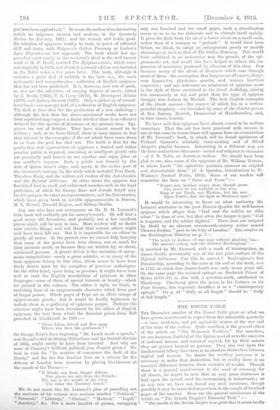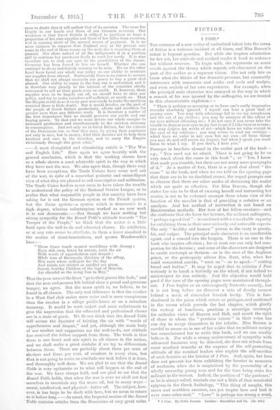THE ROUND TABLE.
TIIE December number of the Round Table gives us what we- have grown accustomed to expect from this admirable quarterly —a sane, moderato, and yet optimistic review of the war and of the state of the nation. Quite excellent is the general effect of the article on " The Economic Position." For ourselves, we aro, however, doubtful of the figures quoted as to the amounts of national income and national capital, for by their nature they are guesses heaped on guesses. They also rest upon the fundamental fallacy that there is an absolute distinction between capital and income. No doubt for working purposes it is necessary to make that distinction, but in reality there is no essential difference between these varieties of wealth. Though there is a general acquiescence in the need of economy for all classes, we regret to note that no very great insistence is laid upon the special need for economizing in intoxicants ; or at any rate we have not found any such insistence, though possibly it may lie concealed somewhere in the couple of hundred pages of tho number. Hero are the general conclusions of the article on " The British Empire's Financial Task "
" The wealth of the British Empire is so great that it seems hardly opon to doubt that it will outlast that of its enemies. The issue lies largely in our hands and those of our kinsmen overseas. Our weakness is that Great Britain is obliged to purchase so largo a proportion of her own eupplios and those of her Allies from overseas, and is running short of the normal means of payment. It is no more chimera to suppose that England may at the present rate come to the and of those means on the scale she is requiring them at present. She alone indeed of all the belligerents is in a position still to continuo her purchases freely to meet her needs. It is wise therefore not to shut our eyes to tho possibilities of tho future. Germany has been forced to live on herself. Whether she can continuo to do so indefinitely remains to be seen. We on tho other hand have based our whole war policy on our ability to maintain our supplies from abroad. Fortunately them is no reason to assume that we shall not always maintain our power to buy a groat deal abroad. Our ability to repay in the long run is undoubted, and it is therefore very greatly to the interest of the countries chiefly concerned to sell us their goods oven on credit. If, however, these supplies were to be largely cut off, we should have to alter our policy, and try to make ourselves self-sufficient, or nearly so. That the Empire could do so if every part wore ready to make the sacrifices required there is little doubt. But it would involve, on the part of the people of Great Britain particularly, efforts and sacrifices far greater oven than any hitherto made. It is therefore a matter of the first importance that wo should preserve our credit and our buying power. To that end we must devote our whole energies to . increased production and simultaneously to the strictest economy in consumption. And not only wo in Groat Britain, but the citizens of the Dominions too, so that they may, by giving their assistance not only in men, but in money, lend their decisive aid to help their brothers and ours in the trenchoo, and to carry the Empire victoriously through this great crisis."
—A most thoughtful and stimulating article is " The War and English Life." Here again we agree heartily with the general oonclusion, which is that the working classes have • as a whole shown a most admirable spirit in the way in which they have mot tho war. We also agree that, though there may have been exceptions, the Trade Unions have come well out • of the war, in spite of a somewhat pedantic and unintelligent view of what they are pleased to call conscription and militarism. The Trade Union leaders never seem to have taken the trouble to understand the policy of the National Service League, or to . realize that what responsible people in this country have been asking for is not the German system or the French system, but the Swiss system—a system which is democratic: in a
high degree, whereas voluntaryism worked as we now work it.•is not democratic.—But though we have nothing but strong sympathy for the Round Table's attitude towards "Tho
Temper of the People," we think that the writer is a little hard upon the well-to-do and educated classes. Ho attributes, or at any rate seems to attribute, to them a lower standard in the matter of stout-heartedness, and quotes Wordsworth's linos :- " Those times touch monied worldlings with dismay :
Even rich men, brave by nature, taint the air With words of apprehension and despair : While tens of thousands, thinking of the affray,
Mon unto whom Buffioient for the day And minds not stinted or untilled are given, Sound, healthy Children of the God of Heaven, Are cheerful as the rising Sun in May."
That the poor men at tho front " go to their graves like beds," and that the mon andovomen left behind show a proud and generous temper, we agree. But the same spirit is, we believe, to be found in all classes. The only real difference is that the croaker in a West End club makes more noise and is more conspicuous than the croaker in a village public-house or on a suburban tramway. It would be most unjust and most unfortunate to give the impression that the educated and professional classes are in a state of panic. Wo do not think that the Round Table will accuse the Spectator of tainting the air with " words of
apprehension and despair," and yet, although the main body of our readers and supporters are the well-to-do, our attitude has received the fullest support from them. The truth is that
there is one heart and one spirit in all classes in the nation, and we shall make a groat mistake if we try to differentiate between them. There aro probably about three per cent, of slookers and three per cant. of croakers in every class, but that is not going to make us conclude our task before it is done, and thoroughly well done. We are glad to see that tho Round Table is very optimistic as to what will happen at the end of the war. We have always held, and are glad to see that the Bound Table holds, that when the war is over we shall not find ourselves in essentials any the worse off, but in many ways= moral, intellectual, and physical—better off. The subject, how-
ever, is too largo to bo dealt with hero, but we mean to return to it before long.—As .usual, the Imperial section of the Round Table contains articles from tho Dominions of very great value,





















































 Previous page
Previous page